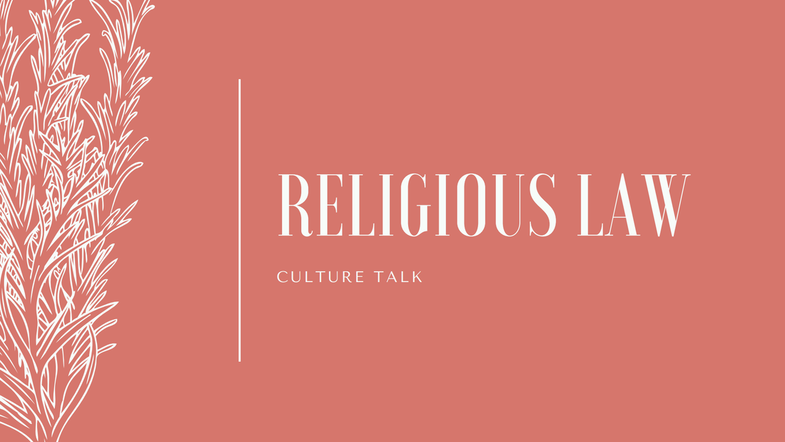Religious law is based on religious texts and codes that define the rules of society. There is an intersection between political and family life when it comes to religious law because the religious texts and codes influence how the government should operate. Religious law was heavily implemented in earlier legal systems in history. However, during the Enlightenment, law began to become less secular since the major tenant focused on the government having separation of church and state. Today, religious law is the basis of Muslim predominant societies, such as countries in Middle East and North Africa, and influences the daily lives of people of other faiths.
Islamic law is the well-known religious law in countries today. The sharia and Quran dictate how society and government should operate. Sharia law originated in the Quran, the religious text of Islam, and the Sunnah, the teachings and deeds of Mohammed, and it is more explicit over crime punishments, lifestyles for the different genders, and living for all Muslims. In terms of punishments, they are divided into two categories: hadd (set penalties) and tazir (up to the judges to set the punishment). Sharia law also dictates personal and family lifestyle, such as how to pray and provide alms to the poor. In current times, some countries, such as Saudi Arabia, have been using sharia law to influence family life rather than use it to govern people.
Canon law is another example of religious law, which the Christian teachings influenced canon law. This became a more prevalent legal system, which joined religion and government together, especially after Christianity became a recognized religion in the Roman Empire. Christian teachings influenced how the government should operate, therefore showing more importance towards religious figures and institutions, such as the popes and cardinals. For example, the Roman Catholic Church followed canon law and served as an important governmental institution during the Middle Ages. Canon law began to lose relevance when church and state became separate throughout the 16th through 18th century, in which Protestantism began to rise.
Today, canon law is used in Roman Catholic communities primarily for religious reasons, and not applied in the government. Canon law is the rules and traditions that Catholics follow today, such as criteria for baptism and funerals or steps on how to proceed with religious services.
In India, the Laws of Manu served as religious law for Hindu families. The Law of Manu covered rules and customs of family and property. When the British came, Anglo-Indian laws helped preserve those traditions mentioned in the Laws of Manu, such as passing laws of Hindu marriage and adoption.
Another religious legal system that influences the daily lives of individuals is Jewish law. The Halakha is religious laws derived from the Old Torah. There are 613 mitzvots, which are known as the Laws of Moses and include the Ten Commandments. These laws are applicable to family and personal life, and are used more by Conservative Jewish families and rabbis.
Even though religious law is not used as the country’s main legal system, it still carries importance in a person’s religious life. These laws dictate how a person of a certain faith should abide by the rules of that faith.
Islamic law is the well-known religious law in countries today. The sharia and Quran dictate how society and government should operate. Sharia law originated in the Quran, the religious text of Islam, and the Sunnah, the teachings and deeds of Mohammed, and it is more explicit over crime punishments, lifestyles for the different genders, and living for all Muslims. In terms of punishments, they are divided into two categories: hadd (set penalties) and tazir (up to the judges to set the punishment). Sharia law also dictates personal and family lifestyle, such as how to pray and provide alms to the poor. In current times, some countries, such as Saudi Arabia, have been using sharia law to influence family life rather than use it to govern people.
Canon law is another example of religious law, which the Christian teachings influenced canon law. This became a more prevalent legal system, which joined religion and government together, especially after Christianity became a recognized religion in the Roman Empire. Christian teachings influenced how the government should operate, therefore showing more importance towards religious figures and institutions, such as the popes and cardinals. For example, the Roman Catholic Church followed canon law and served as an important governmental institution during the Middle Ages. Canon law began to lose relevance when church and state became separate throughout the 16th through 18th century, in which Protestantism began to rise.
Today, canon law is used in Roman Catholic communities primarily for religious reasons, and not applied in the government. Canon law is the rules and traditions that Catholics follow today, such as criteria for baptism and funerals or steps on how to proceed with religious services.
In India, the Laws of Manu served as religious law for Hindu families. The Law of Manu covered rules and customs of family and property. When the British came, Anglo-Indian laws helped preserve those traditions mentioned in the Laws of Manu, such as passing laws of Hindu marriage and adoption.
Another religious legal system that influences the daily lives of individuals is Jewish law. The Halakha is religious laws derived from the Old Torah. There are 613 mitzvots, which are known as the Laws of Moses and include the Ten Commandments. These laws are applicable to family and personal life, and are used more by Conservative Jewish families and rabbis.
Even though religious law is not used as the country’s main legal system, it still carries importance in a person’s religious life. These laws dictate how a person of a certain faith should abide by the rules of that faith.
RESOURCES FOR EDUCATORS
| religious_law.pdf | |
| File Size: | 2589 kb |
| File Type: | |
